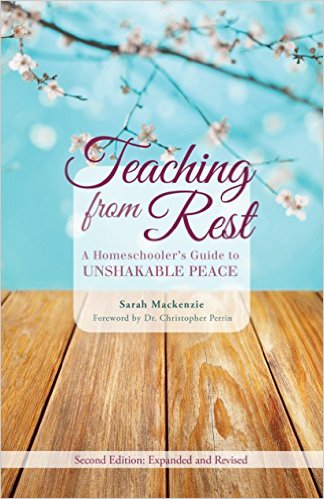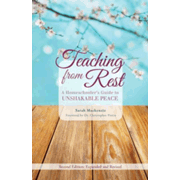For years I have recommended that new homeschoolers read For the Children’s Sake by Susan Schaeffer Macaulay so that they can develop a vision for education that goes beyond the academics. That book is still excellent, especially for those who lean toward a Charlotte Mason approach to education.
When I came across Teaching from Rest: A Homeschooler’s Guide to Unshakable Peace, I suspected that I might have discovered something on par with For the Children’s Sake. It exceeded my expectations with a fresh approach that is perfect for today’s homeschooling parents, so much so that I was a little more than half way through the book before I ordered copies for three homeschooling moms I know.
It seems to me that author Sarah Mackenzie has managed to strike that perfect balance of encouragement and information. This little gem from the introduction exemplifies her very personal style of writing:
Here is the bare truth: Not an hour passes without the enormity of the task I have taken on bringing me to my knees. This work of homeschooling and raising hearts and souls and bodies is hard. It is more than I can do in my own strength. Even so, more than anything else, I desire to teach and mother in a way that pleases God. Some days that feels like feeding the five thousand. But He is not asking me to feed the five thousand; He just wants me to bring my basket of loaves and fish and lay them at His feet (pp. xiii-xiv).
This might give you the impression that this is just a devotional for homeschool moms. Parts of it do have that flavor, but it’s also full of practical wisdom. Mackenzie spends a significant amount of time discussing how to simplify your curriculum, keeping it manageable, and accomplishing what you need to with each child. For example, she presents five specific ways to simplify the curriculum, and her second point is “Integrate.” She uses the example of reading aloud from The Merry Adventures of Robin Hood, explaining that this isn’t just so that she can check off “literature” on the subject checklist. Reading a book like this accomplishes much more as it integrates history, geography, vocabulary, writing, theology, and philosophy, although how well that happens depends somewhat upon how you and your children engage with the book. Mackenzie says,
I think of integration as a kind of curricular power punch. I want to choose published resources and subjects that are going to give me a lot of bang for my buck, so I try to think carefully before I add anything to our docket. How much value will this book/curriculum/assignment add? Is it going to add enough value to be worth the time it will take to engage with it? (p.31)
While simplifying the curriculum is a critical strategy for homeschool success, equally important is reducing the time pressures that overwhelm so many homeschooling parents. Mackenzie addresses the problem of simplifying our schedules with another five points. This is where you’ll learn about “looping” your schedule—a very practical technique that I’ll let you read about in her book.
Mackenzie isn’t promoting a particular approach to homeschooling although it seems that she uses a combination of classical, Charlotte Mason, and unit study approaches. As you read you will glean some very practical strategies that will be useful no matter what approach you choose to use. However, I do need to warn you that after reading this book, veteran homeschoolers might find themselves seriously reevaluating what they have been doing. But then isn’t that the point of reading a book like this?
I must add that the book is only 89 pages long, so even the busiest mom can manage to get through it. Even so, I recommend that you read it in sections, taking time to absorb and reflect on what she presents. For some homeschoolers, getting to that place of “rest” with our homeschooling will require letting go of dearly-held notions of what our homeschooling should look like or what we should be accomplishing. For others, it might just help you tweak what you are doing to bring more pleasure and less stress. Whatever your situation—beginner or veteran, confident or insecure, overwhelmed or on an even keel—I know that you will benefit from reading this book










